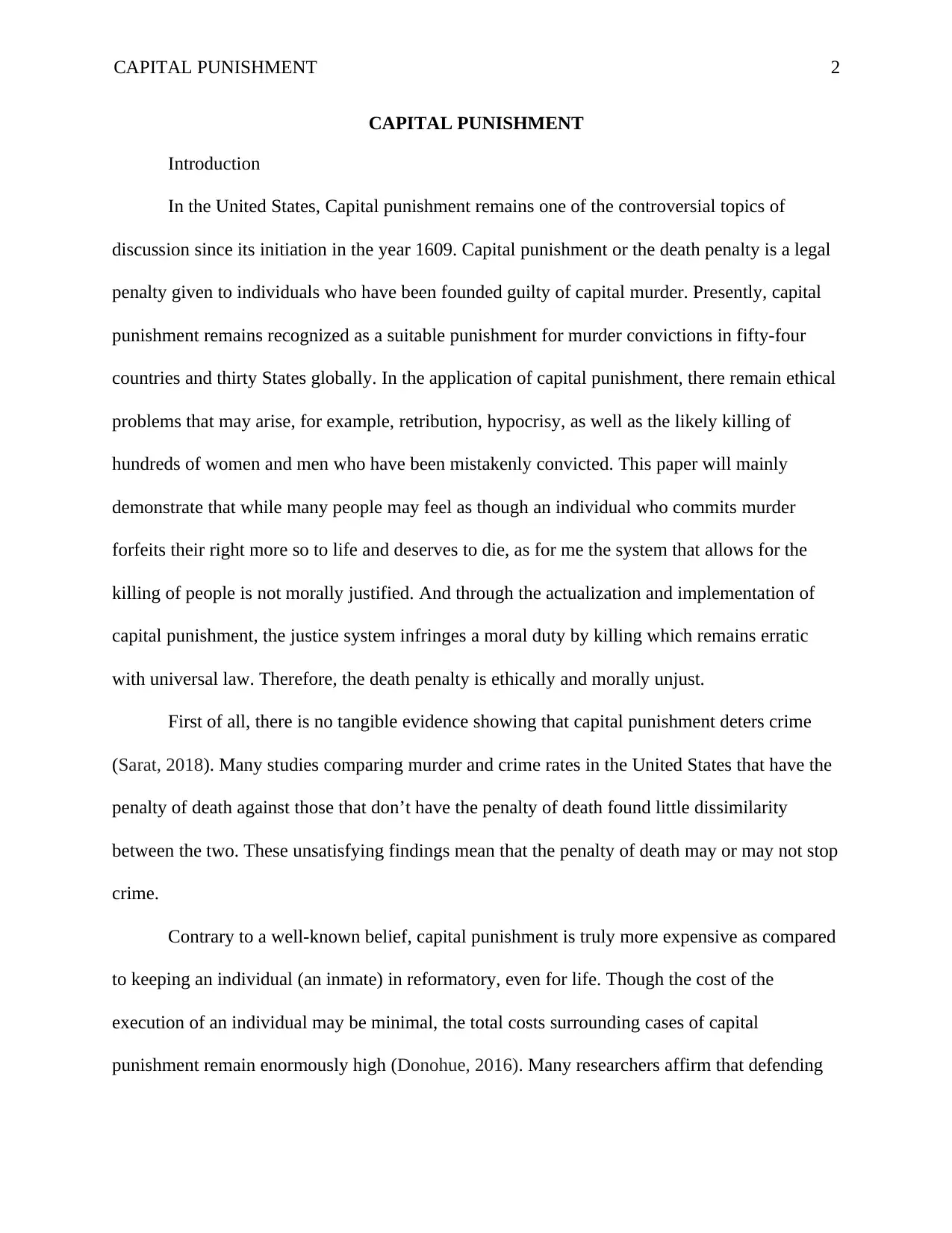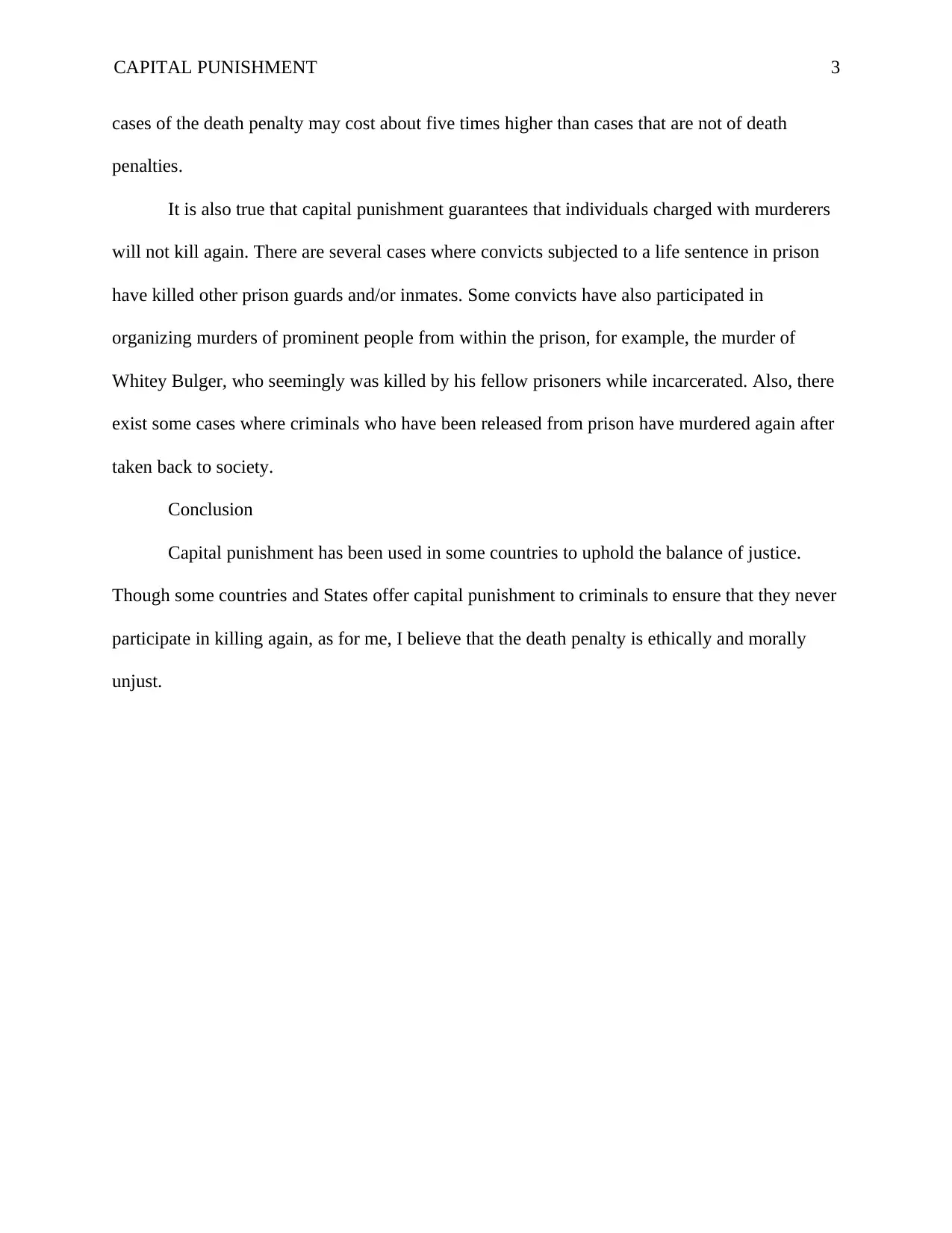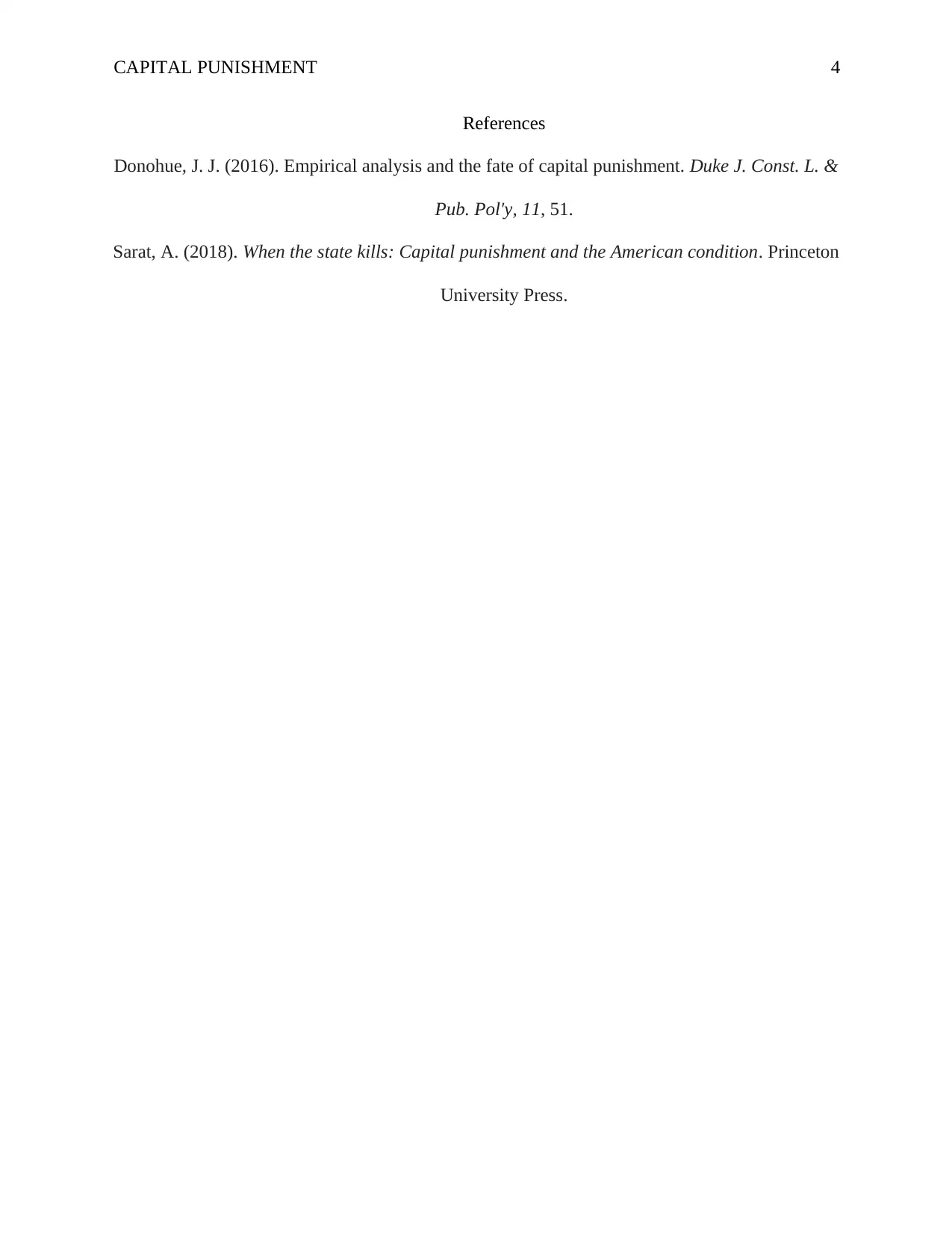Capital Punishment: An Examination of Ethical and Moral Justifications
VerifiedAdded on 2022/11/29
|4
|571
|156
Essay
AI Summary
This essay provides an ethical and moral analysis of capital punishment, arguing against the death penalty. It starts by acknowledging the debate surrounding capital punishment and its justification. The essay then presents arguments against the death penalty, citing that there is no evidence that capital punishment deters crime. It also mentions that the cost of death penalty cases is higher than life imprisonment. The author concludes that capital punishment is ethically and morally unjust. References from Donohue (2016) and Sarat (2018) are included to support the arguments made in the essay.

Running head: CAPITAL PUNISHMENT 1
Capital Punishment
Name
Institution
Capital Punishment
Name
Institution
Paraphrase This Document
Need a fresh take? Get an instant paraphrase of this document with our AI Paraphraser

CAPITAL PUNISHMENT 2
CAPITAL PUNISHMENT
Introduction
In the United States, Capital punishment remains one of the controversial topics of
discussion since its initiation in the year 1609. Capital punishment or the death penalty is a legal
penalty given to individuals who have been founded guilty of capital murder. Presently, capital
punishment remains recognized as a suitable punishment for murder convictions in fifty-four
countries and thirty States globally. In the application of capital punishment, there remain ethical
problems that may arise, for example, retribution, hypocrisy, as well as the likely killing of
hundreds of women and men who have been mistakenly convicted. This paper will mainly
demonstrate that while many people may feel as though an individual who commits murder
forfeits their right more so to life and deserves to die, as for me the system that allows for the
killing of people is not morally justified. And through the actualization and implementation of
capital punishment, the justice system infringes a moral duty by killing which remains erratic
with universal law. Therefore, the death penalty is ethically and morally unjust.
First of all, there is no tangible evidence showing that capital punishment deters crime
(Sarat, 2018). Many studies comparing murder and crime rates in the United States that have the
penalty of death against those that don’t have the penalty of death found little dissimilarity
between the two. These unsatisfying findings mean that the penalty of death may or may not stop
crime.
Contrary to a well-known belief, capital punishment is truly more expensive as compared
to keeping an individual (an inmate) in reformatory, even for life. Though the cost of the
execution of an individual may be minimal, the total costs surrounding cases of capital
punishment remain enormously high (Donohue, 2016). Many researchers affirm that defending
CAPITAL PUNISHMENT
Introduction
In the United States, Capital punishment remains one of the controversial topics of
discussion since its initiation in the year 1609. Capital punishment or the death penalty is a legal
penalty given to individuals who have been founded guilty of capital murder. Presently, capital
punishment remains recognized as a suitable punishment for murder convictions in fifty-four
countries and thirty States globally. In the application of capital punishment, there remain ethical
problems that may arise, for example, retribution, hypocrisy, as well as the likely killing of
hundreds of women and men who have been mistakenly convicted. This paper will mainly
demonstrate that while many people may feel as though an individual who commits murder
forfeits their right more so to life and deserves to die, as for me the system that allows for the
killing of people is not morally justified. And through the actualization and implementation of
capital punishment, the justice system infringes a moral duty by killing which remains erratic
with universal law. Therefore, the death penalty is ethically and morally unjust.
First of all, there is no tangible evidence showing that capital punishment deters crime
(Sarat, 2018). Many studies comparing murder and crime rates in the United States that have the
penalty of death against those that don’t have the penalty of death found little dissimilarity
between the two. These unsatisfying findings mean that the penalty of death may or may not stop
crime.
Contrary to a well-known belief, capital punishment is truly more expensive as compared
to keeping an individual (an inmate) in reformatory, even for life. Though the cost of the
execution of an individual may be minimal, the total costs surrounding cases of capital
punishment remain enormously high (Donohue, 2016). Many researchers affirm that defending

CAPITAL PUNISHMENT 3
cases of the death penalty may cost about five times higher than cases that are not of death
penalties.
It is also true that capital punishment guarantees that individuals charged with murderers
will not kill again. There are several cases where convicts subjected to a life sentence in prison
have killed other prison guards and/or inmates. Some convicts have also participated in
organizing murders of prominent people from within the prison, for example, the murder of
Whitey Bulger, who seemingly was killed by his fellow prisoners while incarcerated. Also, there
exist some cases where criminals who have been released from prison have murdered again after
taken back to society.
Conclusion
Capital punishment has been used in some countries to uphold the balance of justice.
Though some countries and States offer capital punishment to criminals to ensure that they never
participate in killing again, as for me, I believe that the death penalty is ethically and morally
unjust.
cases of the death penalty may cost about five times higher than cases that are not of death
penalties.
It is also true that capital punishment guarantees that individuals charged with murderers
will not kill again. There are several cases where convicts subjected to a life sentence in prison
have killed other prison guards and/or inmates. Some convicts have also participated in
organizing murders of prominent people from within the prison, for example, the murder of
Whitey Bulger, who seemingly was killed by his fellow prisoners while incarcerated. Also, there
exist some cases where criminals who have been released from prison have murdered again after
taken back to society.
Conclusion
Capital punishment has been used in some countries to uphold the balance of justice.
Though some countries and States offer capital punishment to criminals to ensure that they never
participate in killing again, as for me, I believe that the death penalty is ethically and morally
unjust.
⊘ This is a preview!⊘
Do you want full access?
Subscribe today to unlock all pages.

Trusted by 1+ million students worldwide

CAPITAL PUNISHMENT 4
References
Donohue, J. J. (2016). Empirical analysis and the fate of capital punishment. Duke J. Const. L. &
Pub. Pol'y, 11, 51.
Sarat, A. (2018). When the state kills: Capital punishment and the American condition. Princeton
University Press.
References
Donohue, J. J. (2016). Empirical analysis and the fate of capital punishment. Duke J. Const. L. &
Pub. Pol'y, 11, 51.
Sarat, A. (2018). When the state kills: Capital punishment and the American condition. Princeton
University Press.
1 out of 4
Related Documents
Your All-in-One AI-Powered Toolkit for Academic Success.
+13062052269
info@desklib.com
Available 24*7 on WhatsApp / Email
![[object Object]](/_next/static/media/star-bottom.7253800d.svg)
Unlock your academic potential
Copyright © 2020–2026 A2Z Services. All Rights Reserved. Developed and managed by ZUCOL.





